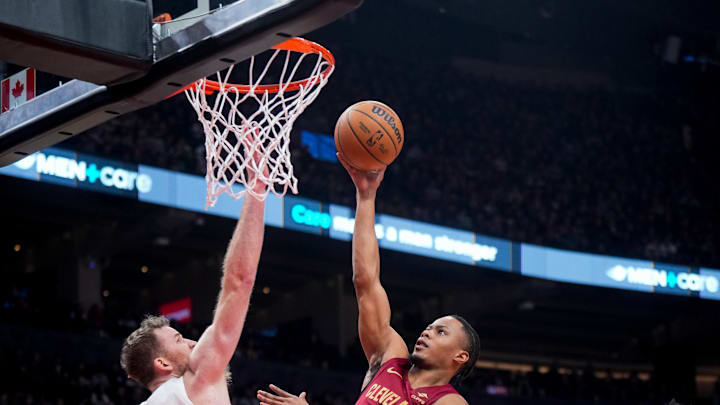The outlook of the Cleveland Cavaliers’ season following the injuries to Evan Mobley (knee) and Darius Garland (jaw fracture) looked bleak. The starting lineup last played together in the Dec. 6 win at home over the Orlando Magic, and even then, it had accumulated just a 6-5 record.
Coach J.B. Bickerstaff could have rolled with Craig Porter Jr. as Garland’s sub and continued using Dean Wade in Mobley’s place, but he got creative, leaning on the guy with a lot to prove: Isaac Okoro.
The Cavs gave Okoro a shot
At Cavaliers practice on Dec. 5, Okoro said every team needs someone like him. “You need somebody that’s going to be an energy guy, someone that does the little things, the dirty work. Not a lot of guys in the NBA want to do that…”
Bickerstaff soon slotted Donovan Mitchell and Max Strus a position down, and Okoro was inserted into the rotation. The latter brings defense and 3-point shooting. That lineup - Mitchell, Strus, Okoro, Wade and Allen - is already tied for the sixth-most used of 2023-24 with three wins and four losses, plus it scores 125.6 points per 100 possessions. (Mitchell was absent with an illness in the loss against the New Orleans Pelicans and the wins over the Utah Jazz, Dallas Mavericks and Chicago Bulls).
In the eight games since Dec. 16, the squad’s record is 5-3. Okoro is averaging 13.5 points, making 52.9 percent of his attempts, with 3.5 rebounds and 3.5 assists. His season averages are 8.8 points, converting 49.3 percent of his shots, with 3.4 rebounds and 2.1 assists. Additionally, in 2022-23, Okoro only finished two games where he logged between five and nine assists. He’s already matched that this season.
Okoro scores without a play run for him. It’s usually putbacks, transition bombs, back door cuts, weak side triples and the occasional drive-by. One area he’s significantly improved his accuracy from last season is the short mid-range. Attempts from this zone are only 13.2 percent of his shot diet, yet there has been a 13 percent increase in efficiency (59), good enough for the 92nd percentile of his position, per Cleaning the Glass.
In the squad’s recent loss to the Raptors in Toronto on New Year's, Okoro missed all four 3-point attempts but feasted inside the arc. He finished around Scottie Barnes and R.J. Barrett in transition, seized the baseline for a layup, plus canned a running hook over Pascal Siakam, who is three inches taller. In the failed second-half comeback, he registered two steals and a block.
Defensively, Okoro is a communicator and the sharpest on the perimeter for the Cavaliers. This season, he has spent 67 percent of his time tracking guards, holding them to 42.6 percent field goal shooting. While guarding his man, he averages .97 miles traveled for the year and 1.14 over his stint as a starter.
Either in full-court press or in the half-court, he is still hard for opposing ball handlers to shake because of his speed, instincts and wide frame. Over this eight-game stretch, he is recording a 44.7 defensive field goal percentage while checking CJ McCollum, Coby White, Luka Dončić, Damian Lillard and Barnes, among others.
Of the group above, McCollum struggled mostly. Okoro stayed with the ball and maneuvered around screens to successfully contest deep jumpers and a 10-foot fade away.
In year four of the Okoro experience, he’s become more valuable than ever as he’s stepped up when the team has needed it most. His work is encouraging, and when Garland and Mobley return, Bickerstaff must devise a rotation that can squeeze this production out of Okoro as his minutes with the starters are staggered.
